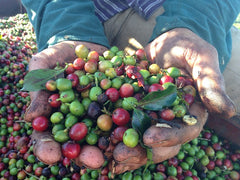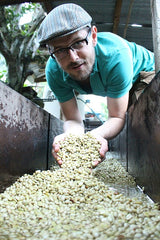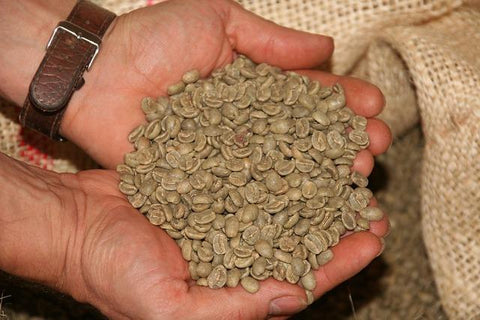Organic coffee beans have become a hot commodity in the wholesale coffee business. When you buy bulk organic coffee or organic green coffee beans, how does it impact your business and the environment?
First, let’s look at how conventional coffee beans grown. Conventional coffee beans are treated with pesticides, herbicides and synthetic fertilizers. Adding chemicals to the soil has an environmental impact, and it exposes the coffee farmers to chemicals when they spray and harvest the coffee beans. The water run-off from these farms may affect the soil and groundwater in the surrounding communities. Most conventional coffee plants are hybridized to withstand direct sunlight, even though coffee plants are traditionally grown in the shade. Forests are cut down to make room for coffee plants to grow in the sun, which destroys the natural habitat for forest animals, flora and fauna. Conventional coffee beans produce a very high yield for the farmer.
 Second, let’s see how organic coffee beans are grown. Organic green coffee beans are not treated with synthetic chemicals, fertilizers or pesticides. Organic coffee is grown with organic fertilizers such as manure and compost. Organic coffee is usually grown in shady forests where the natural ecosystem is preserved. The forest plants and animals help manage the insects that feed on coffee plants, and the creatures contribute to the natural fertilization of the soil. Organic coffee farms are less likely to have water erosion, and if erosion does occur, there are no chemicals to run-off into the local communities.
Second, let’s see how organic coffee beans are grown. Organic green coffee beans are not treated with synthetic chemicals, fertilizers or pesticides. Organic coffee is grown with organic fertilizers such as manure and compost. Organic coffee is usually grown in shady forests where the natural ecosystem is preserved. The forest plants and animals help manage the insects that feed on coffee plants, and the creatures contribute to the natural fertilization of the soil. Organic coffee farms are less likely to have water erosion, and if erosion does occur, there are no chemicals to run-off into the local communities.
In order for wholesale organic green coffee beans to be certified organic, the bulk organic coffee beans must be processed according to strict standards. In the United States, the standards are determined by the National Organic Program within the USDA, which requires an ecological balance of biodiversity conservation and sustainable farming practices. An organic coffee farm must be free from synthetic fertilizers and pesticides for at least three years in order to attain the status of certified organic.
What are the major benefits of organic coffee?
Health benefits:
- Reducing the amount of pesticides and synthetic chemicals that are consumed.
- Natural fertilizers mean the soil contains more nutrients which means the organic coffee beans contain more antioxidants, vitamins and minerals.
Environmental benefits:
- Toxic chemicals are not introduced into the air, water or soil in the local coffee growing communities.
- Forests are not cut down and the native animals and vegetation are preserved.
- Natural vegetation prevents soil erosion and keeps the soil more nutrient rich. This allows farmers to continue sustainable farming practices.
Social benefits:
- Coffee farmers and growers are not exposed to toxic chemicals just to make a living.
- Coffee growers live in communities where the residents rely on local water sources for their survival.
- Organic coffee farms provide employment in a safe working environment to local residents in their communities.
- Organic coffee growers typically follow fair trade practices because it benefits their community and because their customers insist upon it.
Now that we understand the difference between conventional and organic coffee and the benefits of organic coffee, how does the sale of bulk organic coffee beans and wholesale organic green coffee beans affect your business?
 The organic coffee market has grown substantially as consumers are demanding coffee that is produced without chemicals. These consumers are willing to pay a premium for bulk organic green coffee beans that do not contain pesticides and other synthetic ingredients. Purchasing organic coffee beans wholesale and selling bulk organic coffee not only supports a healthy ecosystem and sustainable farming practices, but it also provides a superior coffee experience for consumers who visit your café, store or restaurant.
The organic coffee market has grown substantially as consumers are demanding coffee that is produced without chemicals. These consumers are willing to pay a premium for bulk organic green coffee beans that do not contain pesticides and other synthetic ingredients. Purchasing organic coffee beans wholesale and selling bulk organic coffee not only supports a healthy ecosystem and sustainable farming practices, but it also provides a superior coffee experience for consumers who visit your café, store or restaurant.
Here are a few tips to remember when you sell wholesale organic coffee:
- Make sure the coffee beans are certified organic.
- Some coffee growers may not have organic certification but do use organic farming methods.
- Not all certified organic coffee beans are fair trade. It’s a good idea to check if the grower employs fair trade practices.
- Consumers who are willing to pay a little more for bulk organic coffee beans tend to be repeat buyers.
Java Bean Plus provides top quality certified organic coffee beans from organic coffee farmers around the world, including Colombia, Peru, Ethiopia, Indonesia, Nicaragua and Mexico. For organic roasted coffee beans, click here. For organic green coffee beans, click here.



